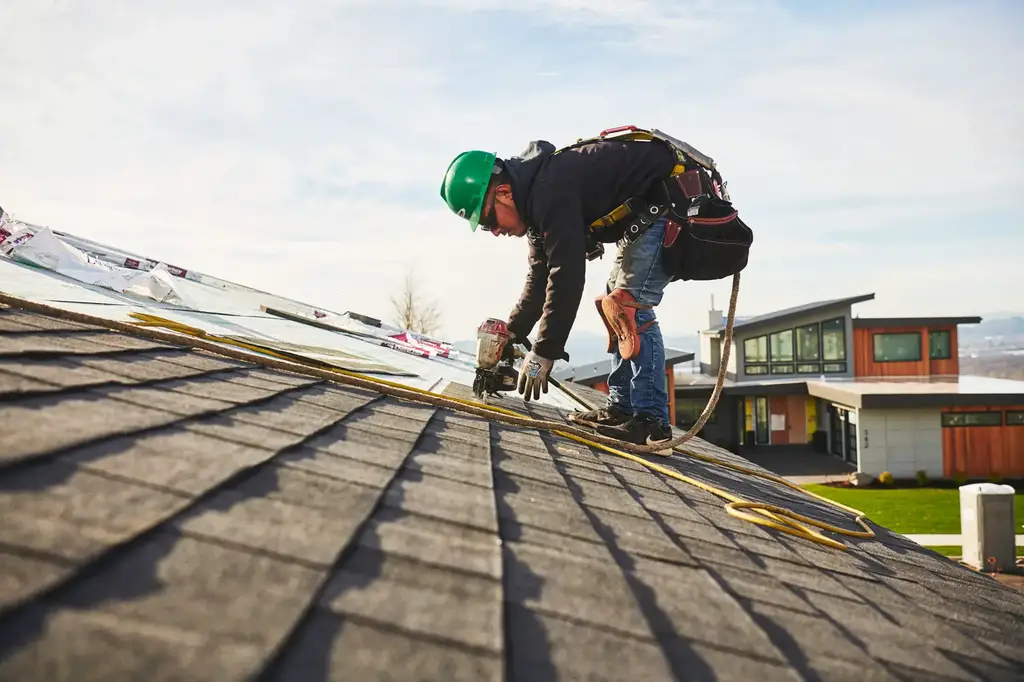Selecting a roofer requires verified licensure and comprehensive insurance coverage. Gauge experience and demand local references for reliability assessments.
Finding the right roofer for your home isn’t just about securing the best price; it’s a decision that affects the longevity and quality of your roof. Homeowners should prioritize a roofer’s reputation and workmanship over cost alone, ensuring that qualifications and experience align with the needs of the project.
Trust in a roofer comes from their track record of delivering durable, well-constructed roofs and their ability to communicate clearly about the job. Remember, a solid warranty on their work is not just a perk but a necessity. By considering these factors, you not only protect your investment but also gain peace of mind that your roofer is equipped to handle the intricacies of your roofing project.

Credit: www.thepinnaclelist.com
Essentials In Choosing A Roofer
Finding a qualified roofer is crucial when you’re facing roofing issues or planning a new installation. The right professional can mean the difference between a solid, leak-proof roof and endless problems. This checklist provides essential qualifications to look for, ensuring peace of mind and a job well done.
Importance Of Professional Qualifications
Professional qualifications act as a testament to a roofer’s expertise and commitment to the craft. Seasoned roofers should have a proven track record, showcase their skills through certifications, and possess a portfolio of past projects. Such credentials not only demonstrate proficiency but also imply a dedication to staying up-to-date with the latest roofing techniques and materials.
Identifying State-specific Licensing Requirements
Licensing offers a form of assurance that a roofer is legally authorized to operate in your state. These requirements vary significantly, so it’s imperative to consult your local state regulations. Typically, licensed roofers have undergone examinations to verify their knowledge and skill level. Ensure that any potential roofer can provide a valid license number for verification.
Value Of Insurance And Bonding For Roofers
Insurance and bonding are non-negotiable when hiring a roofer. Strong working relationships begin with the security of full insurance coverage. This not only protects roofers from accidents but also provides your property with coverage against potential damages. Bonding, on the other hand, ensures the completion of your project. Ensure that the roofer offers proof of both, to safeguard your investment.
Checklist For Roofer Expertise
Embarking on a roofing project demands prudence in selecting a contractor equipped with the requisite skills and reliability. Making the right choice is crucial to ensure the longevity and efficacy of your roof. The Checklist for Roofer Expertise serves as a guide to vet potential roofing professionals thoroughly before committing to their services.
Recognizing Proper Training And Certification
Roofing entails intricate workmanship and a deep understanding of materials and techniques. Certifications are validators of a roofer’s commitment to professionalism and mastery of their craft. Ensure your roofer possesses verifiable training, typically displayed through trade associations or recognized institutions. Some key credentials to look for include:
- Certified Roofing Contractor licenses, varying by region
- Manufacturer endorsements indicating specialized training with specific roofing materials
- Membership in national and local roofing associations, signaling ongoing education and adherence to best practices
Understanding Roofing Experience And Local Reputation
Experienced roofing professionals bring not only technical skill but also nuanced understanding of local building codes and climate considerations. A stellar local reputation is a testament to a roofer’s reliability and quality. Ascertain this by exploring:
- Years of service in the industry and the local area
- Project portfolio showcasing past work
- Testimonials and reviews from previous customers
- The roofer’s handling of warranties and issue resolution
Assessing The Breadth Of Roofing Services Offered
The scope of services a roofer offers can indicate their capacity to handle diverse roofing challenges. A full-service contractor capable of managing installations, repairs, and maintenance can be a prudent choice for comprehensive care of your roof. Critical services to consider include:
| Service Type | Importance |
|---|---|
| Inspections | Identifies potential issues early |
| Repairs | Addresses damage and prevents further deterioration |
| Replacements | Provides new roofing systems when necessary |
| Maintenance | Extends the life of the roof and ensures optimal performance |
Examine the range of materials they work with, ensuring they can provide options that align with your needs and budget. A roofer skilled in both traditional and modern roofing technologies demonstrates versatility and a keen understanding of evolving roofing solutions.
Analyzing Past Work Quality
Selecting the right roofer for your home is not just about finding the lowest bid; it’s about ensuring the highest quality of work. Analyzing a roofing contractor’s previous projects is crucial in gauging their expertise and attention to detail. Here are some must-do checks:
Requesting And Reviewing Roofing Portfolios
First and foremost, ask for a roofing portfolio. A professional contractor should have a collection of photos or case studies showcasing their completed projects. Here’s what to look for:
- Before-and-after shots that indicate the extent of transformations
- Details on the types of roofing materials used
- Complexity and diversity in roofing projects handled
- Documentation of any specialized craftsmanship or custom work
These visuals can help you assess the roofer’s aesthetic sense and technical proficiency.
Soliciting Homeowner Testimonials And Reviews
Genuine feedback from previous clients can provide invaluable insights:
- Search for the roofer’s business on review platforms and social media.
- Read through both positive and negative reviews to get a balanced understanding.
- Contact past clients, if possible, to discuss their overall experience.
Remember, a high-quality roofer will not only have positive reviews but will also handle any negative feedback professionally.
Investigating The Roofer’s Problem-solving Capabilities
Reroofing or repairs can often uncover unexpected issues. Discover how the roofer has managed such scenarios:
| Problem | Solution | Outcome |
|---|---|---|
| Unexpected structural damage | Thorough assessment and reinforcement | A robust and lasting roof install |
| Weather-related delays | Effective communication and rescheduling | Minimized downtime and client inconvenience |
By understanding how the roofer addresses such issues, you can gauge their expertise and reliability under pressure.
Choosing A Roofer: Key Considerations
Finding a skilled and reliable roofer is paramount to ensuring your roofing project is completed to high standards. Your roof is a significant investment and serves as your home’s first line of defense against the elements, which is why the selection process deserves meticulous attention. Below you’ll find essential considerations broken down into key factors to check off your list when selecting a professional roofer.
Prioritizing Safety Protocols And Regulations
Safety should be at the forefront of any roofing project. The right roofer will demonstrate a clear commitment to the well-being of both their workers and your property. Here is what to look for:
- Compliance with OSHA guidelines: Ensure they adhere to the Occupational Safety and Health Administration’s standards.
- Proper insurance and licensing: Valid workers’ compensation and liability insurance are non-negotiable to protect against accidents.
- Safety training: A reputable roofer will provide ongoing safety training to their team.
Evaluating Communication And Customer Service Skills
Robust communication is the cornerstone of a successful roofing job. A qualified roofer should exhibit:
- Responsiveness: They should promptly reply to calls or emails.
- Clarity: Expect detailed explanations on processes, materials, and timelines.
- Professionalism: Look for signs of a professional demeanor in every interaction.
Testimonials and reviews are excellent resources to gauge a roofer’s customer service history. Feedback from previous clients can provide insight into what your experience might be like.
Comparing Written Estimates And Pricing Transparency
Understanding the financial aspect is critical. A trustworthy roofer should provide a comprehensive and transparent written estimate that breaks down costs. Key elements to consider include:
- Itemized costs: The estimate should list all charges, from materials to labor.
- Total price: Confirm there are no hidden fees.
- Payment terms: Understand the payment schedule and what is expected.
Comparing estimates can help you identify discrepancies and ensure that you’re getting a fair price for quality work. Critical scrutiny of each line item will protect you from overcharges and unexpected expenses.
Red Flags In Qualifications
Choosing a roofer requires due diligence and a keen eye for details. Sometimes, the documents and promises you receive might not align with industry standards, signaling potential pitfalls ahead. Familiarizing yourself with common red flags in a roofer’s qualifications can save you time, money, and a lot of hassle. Let’s explore some warning signs to heed when examining a roofer’s credentials, insurance coverage, and cost estimates.
Spotting Invalid Or Outdated Credentials
Valid credentials are the baseline for any trustworthy roofer. Without them, you’re navigating risky waters. When assessing a roofer’s qualifications, look out for these cautions:
- Certifications with passed expiration dates
- Licenses that seem tempered with or lack an official seal
- Claims of membership in trade organizations without proof to back them up
An authentic roofer maintains up-to-date qualifications and is able to provide clear evidence without hesitation.
Recognizing Signs Of Inadequate Insurance Coverage
Insurance is a non-negotiable when it comes to roofing. Inadequate insurance coverage can leave you exposed to financial and legal troubles should an accident occur on your property. Ensure your roofer has:
- Liability insurance that meets local industry standards
- Workers’ compensation to cover potential employee injuries
Avoid engaging with roofers who lack up-to-date insurance certificates or provide evidence of insurance that:
- Displays coverage amounts suspiciously low for the roofing industry
- Is tailored for different trades irrelevant to roofing
Identifying Too-good-to-be-true Bids And Estimates
Competitive pricing is attractive, but ultra-low bids are potential red flags. When a proposal seems significantly lower than others, it could indicate:
- Use of substandard materials or shortcuts in the work process
- A lack of comprehensive services included in the bid
- Potential for cost overruns and price adjustments after the project begins
Trustworthy estimates should be detailed, reflecting both labor and materials. They should also align somewhat closely with other estimates received, as legitimate roofing professionals generally abide by the same industry standards and cost ranges.
Frequently Asked Questions On Choosing A Roofer: Checklist Of Must-have Qualifications
What Credentials Should A Reputable Roofer Have?
A reputable roofer must have valid licensing, insurance, and bonding. They should also possess certifications from roofing material manufacturers and a solid track record with references. Always verify their qualifications.
How To Verify A Roofer’s Legitimacy?
Check for business licenses, insurance, and bonding. Look for online reviews and Better Business Bureau (BBB) ratings. Contact past clients for feedback. Request proof of qualifications and cross-verify with local regulatory bodies.
What Questions To Ask Before Hiring A Roofer?
Inquire about their experience with your roof type. Ask about warranties, project timelines, and written estimates. Request to know how they handle unexpected issues. Discuss cleanup and waste disposal policies post-job completion.
Is It Important For A Roofer To Have Insurance?
Absolutely, insurance is critical. It protects you from liability in case of accidents or damage during roofing. Ensure the roofer has comprehensive liability and workers’ compensation insurance.
Conclusion
Selecting the right roofer is crucial for your home’s protection and value. Ensure they have the necessary experience, licenses, and insurance. Check customer reviews and warranties offered too. An expert roofer will safeguard your investment, providing peace of mind for years to come.
Make a wise choice; it’s the cornerstone of a secure, beautiful home.

